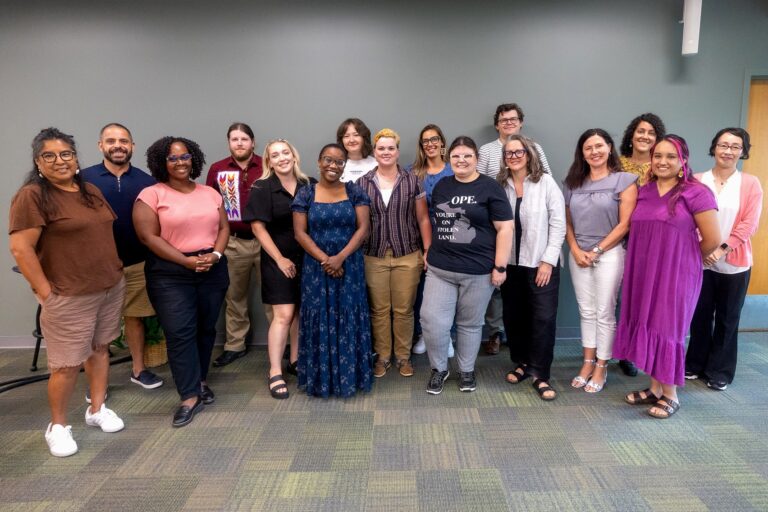To help alleviate the food insecurity crisis in a northern Tanzania community, Jonathan Choti, Assistant Professor of African Languages and Cultures in the Department of Linguistics, Languages, and Cultures at Michigan State University, co-created a project to do just that.
The Improving Food Security in Naitolia Village of Northern Tanzania project led by Choti received a $9,950 Network for Global Civic Engagement (NGCE) grant to support a collaborative effort in Naitolia Village where hunger and malnutrition are common problems due to drought and the wild animals of the area that thwart farming efforts.

With a population of about 3,000 people, Naitolia Village is the site of the six-week summer education abroad program, Sustainable Community Development in Tanzania, that Choti has led since 2015. MSU’s Tanzania Partnership Program (TPP) runs the education abroad program jointly with two Tanzanian universities – the University of Dar es Salaam and Sokoine University of Agriculture.
“Naitolia Village is indeed a deprived community. I observed and abhorred the high levels of malnutrition and hunger there and wanted to help. Then I saw an opportunity with the NGCE grant.”
“Naitolia Village is indeed a deprived community. I observed and abhorred the high levels of malnutrition and hunger there and wanted to help. Then I saw an opportunity with the NGCE grant,” Choti said. “I know it is important to help, to support a need of a community or individual. It is the right thing to do as it uplifts others and, in return, warms the heart of the giver. Naitolians are very kind people. They welcomed TPP and us into their community with open palms. We need to reciprocate their kindness and hospitality.”
The Improving Food Security in Naitolia Village of Northern Tanzania project promoted drought-resistant, perennial vegetables; relocated gardens next to kitchens; and constructed drip gardens using dams. Choti co-created the project with Mary Malekela of the University of Dar es Salaam and Naitolia Village and the In-Country Program Officer of MSU’s Tanzania Partnership Program.

“This project succeeded beyond my initial expectations,” Choti said. “Undoubtedly, the vegetables will go a long way to improving nutrition and, hence, combat malnutrition and hunger in Naitolia Village. The trainings we conducted on drought-tolerant, perennial vegetables and the construction and maintenance of drip irrigation gardens will ensure the sustainability of the project in the community. Through this project, the community acquired knowledge and became empowered while stakeholders established enduring linkages that they can continue to utilize into the future.”
“This project succeeded beyond my initial expectations. Undoubtedly, the vegetables will go a long way to improving nutrition and, hence, combat malnutrition and hunger in Naitolia Village.”
Naitolia Village lies in an arid area that serves as a wildlife corridor located at the edge of Tarangire National Park where it is almost impossible to practice meaningful farming since elephants, zebras, gazelles, wildebeests, and giraffes are common herbivores in the community.
To combat this, the Improving Food Security in Naitolia Village of Northern Tanzania project helped families in the village relocate their gardens near their kitchens to avoid being encroached on by livestock and wild animals. This effort proved to be successful by enhancing the home production of vegetables.

Also, drought-resistant, perennial vegetables were introduced such as Chaya, kisamvu (sweet potato vine), Russian comfrey, and New Zealand spinach. While being able to withstand drought, these vegetables also produce greens year-round, attract few pests, and require a minimum amount of water.
Through the project, community participants were able to purchase vegetable seedlings and seeds for these perennial vegetables. They also built drip gardens and acquired materials and water for the dams.

Community leaders selected 11 families to receive the drip gardens based on the degree of commitment. Drip irrigation technology relies on dependable water sources, so households had to commit to building homestead water harvesting technology. Each household selected received a drip irrigation garden and a 10,000-liter dam built by using a dam liner and agricultural cloth to ensure a steady water supply.
Jonathan Kivuyo, TPP Naitolia Village Program Officer, facilitated the promotion of drought-resistant vegetables in the community while also training people of the village on how to construct dams and drip gardens. About 70 community members participated in the training workshops.

Throughout the five-month project, which began in June 2022, the Naitolia Village community contributed labor, space, skills, water, and indigenous knowledge. And, by the end of the project in November 2022, families started harvesting vegetables with some even selling their produce to buy groceries and other foods.
“The project beneficiaries expressed great appreciation for the support from the initial stages of the project,” Choti said. “Jonathan Kivuyo provided regular updates about the progress of the project. He reported that the community is overjoyed with the results. The families have enough vegetables to eat and some donate and/or sell to their neighbors. They never thought this could happen.”
“The project beneficiaries expressed great appreciation for the support from the initial stages of the project…The families have enough vegetables to eat and some donate and/or sell to their neighbors. They never thought this could happen.”
The MSU students who were part of Choti’s 2022 education abroad program were not involved in the Improving Food Security in Naitolia Village of Northern Tanzania project, but had the opportunity to observe the progress of the work being done. Each year, the education abroad program brings students, faculty, and community members together to complete experiential learning projects in the community, which help educate the students on community development, African cultures, and civic engagement.

At Michigan State University, Choti teaches Swahili and a course in the Center for Integrative Studies in the Arts and Humanities (CISAH) that focuses on African cultures, languages, and literature. The Improving Food Security in Naitolia Village of Northern Tanzania project aligns with his research and scholarship activities, especially the pedagogy of community-engaged learning and teaching and researching on African Studies.
“I am proud of the outcome of our NGCE project…We planned to educate Naitolians on drought-resistant, perennial vegetables and support the construction of drip irrigation gardens and we delivered exactly that. It warms my heart to create such an impact in a deprived society.”
“I am proud of the outcome of our NGCE project. I worked with a fantastic team. I applaud their contribution. We planned to educate Naitolians on drought-resistant, perennial vegetables and support the construction of drip irrigation gardens and we delivered exactly that,” Choti said. “It warms my heart to create such an impact in a deprived society. My work in Tanzania through the education abroad program and the NGCE project has been the highlight of my community-engaged learning approach to education. But we still have more families to help in this place.”
The NGCE funding was made possible through the generosity of the Michigan State University Federal Credit Union (MSUFCU), MSU’s Residential College in the Arts and Humanities (RCAH), and participating MSU colleges and major administrative units.

NGCE is a university-wide teaching and research collaboration founded by RCAH, which supports community-based research with a particular interest in global civic engagement in the United States and abroad. Its mission is to develop sustained relationships through radical reciprocity, collaboration, and investment and to address community engagement issues and implications in a global context.
“I will continue to seek more funding to expand this project across the whole village and beyond…Malnutrition and hunger have no place in our endowed society…We just need to distribute resources equitably to build a more just, more inclusive society.”
The NGCE’s overarching goal is to foster global peace and human security based on mutual respect, independence, and cultural diversity. Tackling food insecurity in a remote community in Tanzania exemplifies this principle.
“I will continue to seek more funding to expand this project across the whole village and beyond,” Choti said. “I want this project to serve as a model for others. I will not tire until every household in Naitolia has constructed a drip garden and planted drought-tolerant, perennial vegetables. Malnutrition and hunger have no place in our endowed society. There is enough food in the World Village for everyone to eat and share. We just need to distribute resources equitably to build a more just, more inclusive society.”

Written by Kim Popiolek
c


